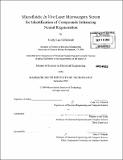Microfluidic in vivo laser microsurgery screen for identification of compounds enhancing neural regeneration
Author(s)
Gilleland, Cody Lee
DownloadFull printable version (4.304Mb)
Other Contributors
Massachusetts Institute of Technology. Dept. of Electrical Engineering and Computer Science.
Advisor
Mehmet Fatih Yanik.
Terms of use
Metadata
Show full item recordAbstract
Discovery of small molecules and novel mechanisms for enhancing neurite regeneration in animal models is significant for therapeutics of central nervous system injuries and neurodegenerative disorders. C. elegans is a widely studied model organisms due to their fully mapped neural network of 302 neurons and amenable genetics. Their small size and short life cycle allows for rapid studies to be conducted; however, after decades of use the manual methods of manipulation have still remained unchanged. This thesis details the development of automated, high-throughput optical and microfluidic technologies for screening C. elegans and demonstrates the production of a reliable system for screening over ten thousand animals. Using the screening system, femtosecond laser microsurgery was performed on thousands of animals followed by incubation in compounds from a chemical library. The screens revealed several high-scoring drug candidates that enhance regeneration after laser microsurgery of C. elegans mechanosensory neurons.
Description
Thesis (S.M.)--Massachusetts Institute of Technology, Dept. of Electrical Engineering and Computer Science, 2009. Cataloged from PDF version of thesis. Includes bibliographical references (p. 41-42).
Date issued
2009Department
Massachusetts Institute of Technology. Department of Electrical Engineering and Computer SciencePublisher
Massachusetts Institute of Technology
Keywords
Electrical Engineering and Computer Science.